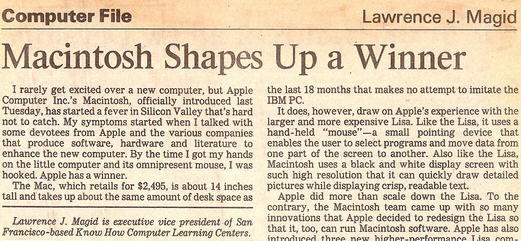by Larry Magid
I was on a plane returning from Kenya when the news of Steve Jobs’ death reached the world. Suspended between continents, I was blissfully unaware that we had just lost one of greatest innovators of all time.
I’m now painfully aware. On Saturday, I walked past his house, about a mile from where I live. Even though it was three days after he died – scores of people were milling around, leaving flowers, notes and even apples with bites taken out, reminiscent of the Apple logo. Many were there to say “thank you” to a man who helped change their lives.

I’ve known Steve for nearly 30 years. It was he who first showed me a prototype of what was to become the Macintosh and although we never became personal friends, we chatted occasionally over the years. Whether in a one-on-one conversation or at a keynote presentations, I have always found Jobs to be incredibly persuasive. He created products that he loved and persuaded the rest of us to love them too.
Changed my life
But even before I met Jobs, he had already changed my life. I bought my first Apple product (an Apple II computer) in 1980 and it launched my career as a technology writer. The Apple II may be crude by today’s standards, but it was years ahead of anything on the market at the time. It was the first computer that was simple and versatile enough for just about anyone to use.
Legacy is about excellence, not technology
Jobs’ legacy isn’t just about building computers, music players, smart phones and tablets. It’s about a commitment to excellence that’s almost unparalleled. In a world where “good enough” is often sufficient, Steve Jobs insisted on more. He knew he couldn’t achieve perfection, but expected people who worked with him to get as close as humanly possible.
For Jobs, technology was an art form. He didn’t conduct focus groups to find out what people want and assign engineers to deliver it. Instead, he envisioned what would make people happy and more productive. He built those products and then, a year or so later, his team would reengineer them to that they were even better. People don’t just buy Apple products, they subscribe to them, upgrading as often as possible just to keep up with Apple’s latest and greatest.
Helped Invent and then re-invent the PC
Jobs and his partner Steve Wozniak weren’t the first to create a personal computer, but they were the first to build one that ordinary people could easily use back in 1977. The Apple II was a masterpiece of its time and even though Woz was the engineer to pieced it together, Jobs was the one who promoted it to the world at a time when hardly anyone envisioned that there would actually be a market for personal computers.
In 1984 Jobs reinvented the personal computer he helped invent. When he first showed me a prototype of the Mac as I was extremely impressed, even though it had far less power, memory, storage or screen size compared the IBM PCs that were popular at the time.
In 2001, he reinvented the way we listen to and buy music. The iPod wasn’t the first digital music player, it was just the best one and it was integrated with software and the iTunes music store making it not just a product but a complete solution.
Likewise the IPhone wasn’t the first smart phone and the iPad was far from the first tablet, yet – with Jobs clearly in control of the design – they were the first to truly catch on. It’s been said before, but it’s so true – Jobs knew what people wanted even before they knew they wanted it.
A national treasure
To me, Jobs wasn’t an icon – he was a flesh and blood human being who I admired and liked but didn’t always agree with. Still, as I’ve said many times during his life,- he was a national treasure. Like the icons featured in Apple’s Think Different commercials – Gandhi, Einstein, Buckminster Fuller, and Martin Luther King – Steve Jobs was bigger than life. He looked at the world not as it was, but how it could become – and he did everything in his power to reshape the world we live in.
Rare video of an Apple Think Different Ad narrated by Jobs himself
Larry Magid blogs at LarrysWorld.com and SafeKids.com
Be the first to comment